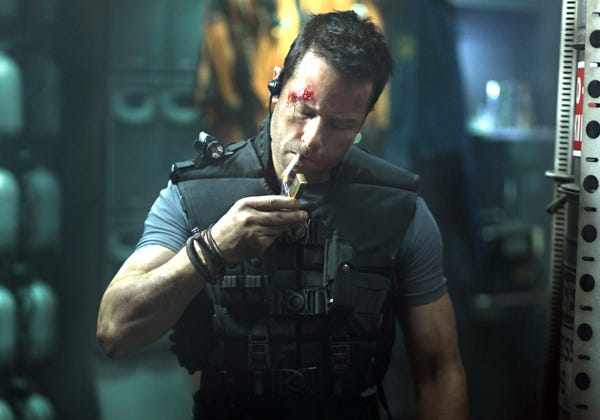Lockout

It’s a telling sign that the most recent sci-fi action film “Lockout” brings to mind would barely qualify for a learner’s permit. That doesn’t mean it’s a bad sign. As in “The Fifth Element,” it feels like Luc Besson, co-writer of both films, concocted the basic story during a teenage fever dream in a high school study hall.
In some moments, “Lockout” seems incapable of writing its own name. At one critical juncture, it appears unable to discern a left eye from a right eye. Because it’s otherwise so difficult to tell, it uses several subtitles to remind us when we’ve jumped from the White House to space and back again.
There will be no more groaningly stupid, ceaselessly tin-eared final exchange of dialogue all year. And there’s this precious exchange:
“Are you saying the International Space Station ran into MS-1?”
“No. I’m saying the opposite … that MS-1 ran into the International Space Station.”
But anything more than arrested adolescence, unpretentious idiocy and a purposeful odor of cheese would doom “Lockout.” You want a muscular, misanthropic ex-CIA agent named Snow infiltrating space jail to save the president’s daughter? You want Snow and the daughter to fall from an air duct into a faux-fellatio position? You want Snow to quip wiseass about “trampolining” a guy’s wife on “coupon night”? You want to see skydiving … in space? You got it.
You’ve also got Guy Pearce playing Snow, and it’s initially a bit like dropping Olivier into a van Damme movie. However, Pearce elevates the wit, charm and appeal of “Lockout” by cutting loose as an invigoratingly raw badass. Fun is not the sort of thing Pearce usually has in his movies, but based on this, he should try it more often. (A sample: “Here’s an apple. Here’s a gun. Don’t talk to strangers. Shoot them.”)
Snow’s like the great-grandson of Kurt Russell’s Snake Plissken. It’s an overt nod to the similarly plotted “Escape from New York,” the rumored reboot of which “Lockout” should render moot and the first of many films it shamelessly hijacks. The lawyers no doubt had a laugh with Besson’s “based on an original idea by” credit.
Set in 2079, “Lockout” opens with a bad espionage deal that leaves Snow’s longtime pal dead and Snow framed for the murder. (Hello, every movie about an abrasive antihero!) A low-level criminal named Mace has the evidence to clear Snow’s name, but Mace has recently been transferred to MS-1. It’s a privately funded, supermax space prison (Is that you, “Fortress," or are you more like "No Escape"?) where the worst of the worst are frozen in stasis. (Oh! Didn’t see you there, “Demolition Man”!)
It’s also where Emilie (Maggie Grace, adept at lifting cheekbones if not dialogue), the U.S. president’s daughter, has just landed. She’s worried the prisoners are being inhumanely experimented upon. Naturally, they thaw out the craziest murderer-rapist, Hydell (a bugnuts Joseph Gilgun), for her to observe. And when he gets her Secret Service agent’s gun, well, it’s a sitchiation!
Hydell soon sets free every prisoner in the hoosegow — all of them with no muscle atrophy and full knowledge of the labyrinthine prison’s hallways, of course. Meanwhile, Snow begrudgingly accepts a seeming suicide mission to save Emilie, find Mace and wipe his slate clean.
At least co-directors / co-writers James Mather and Stephen St. Leger keep the pace fast, the plot thick and the puerile flirtation between Pearce and Grace to a minimum. (The closest thing it achieves to warmth is the McClane-Powell bond between Pearce and Lennie James’ character.)
In the end, this is pass-fail territory — no more, no less. Consider “Lockout” a success by way of social promotion.


